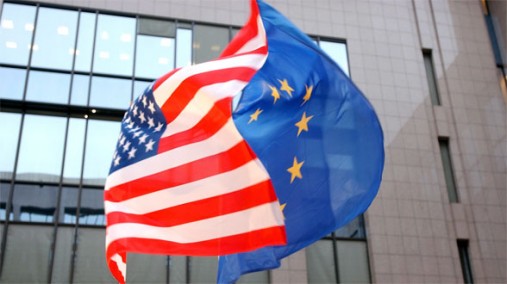Standing before both houses of Congress, President Obama announced he would launch talks on a comprehensive Transatlantic Trade and Investment Partnership agreement with the European Union in his State of the Union address in February.
This decision does not simply represent the next item on this administration’s emerging trade agenda. Rather, this deal — unlike any other trade deal to date — offers the opportunity to lay a foundation for our competitiveness for coming decades.
According to the National Intelligence Council’s “Global Trends” report, by 2030 the United States and its NATO allies will wield less global power (as measured across a range of indicators) than Asia.
Whether this matters greatly depends in part on whether the United States and Europe can agree on a landmark trade and investment pact by the end of next year.
The connection between technical trade negotiations over chlorine-washed chicken and our future global standing is not necessarily self-evident. But creating a common transatlantic marketplace would almost overnight establish global economic and regulatory norms underpinned by core free market principles.
And in a world economy built on the back of standards set within a transatlantic pact, our economy and our businesses are poised to be globally competitive for the long term regardless of the overall share of our global output, or power for that matter.
Don’t get me wrong. The short-term benefits are compelling. The transatlantic relationship is under pressure, mired in a eurozone crisis characterized by austerity, recession, increasing unemployment and decreasing government revenues. But in a crisis, offense is often the best defense.
Americans should not myopically focus only on protecting the U.S. economy from eurozone contagion. Rather U.S. policy should aim to restore confidence and dynamism to the European economy and therefore harness the West as a source of growth and innovation. A deal could boost U.S. gross domestic product by as much as 3 percent.
The long-term impact of any deal may be even more important than the near-term benefits. If the United States and Europe, which together account for nearly half the world’s economy, can reach agreement now (that is, in the coming 18 months), they will set global standards for the 21st century.
If Washington and Brussels fail to reach agreement, American and European businesses may be forced to follow norms set in Shanghai or elsewhere in the coming decades.
Despite the rise of the Asia-Pacific region, the U.S. and European economic relationship is by far the largest in the world. An agreement soon, especially if it includes provisions for other nations to sign on, would set standards that would endure even when transatlantic economic output declines to a third of global output in the coming decades.
Others, including our NAFTA and Transpacific Partnership partners, would be eager to join and reap the benefits. If we take 10 years to reach agreement on tough regulatory issues, we may not carry the heft to translate our bilateral agreement into global norms
In his first term, Obama articulated the building blocks of an animating vision for the transatlantic relationship. Against the backdrop of an uncommon strategic alignment between the United States and Europe in which we largely agree on the most pressing foreign policy challenges, he argued that Europe is the cornerstone for U.S. engagement in the world and that the transatlantic relationship is a catalyst for global action.
Building on this vision, the United States is poised to reinvigorate its relationship with Europe by putting the relationship to work. The United States has an enormous strategic stake in Europe’s future. We are not ambivalent about the outcome of the eurozone crisis. In fact, we cannot succeed in many of our objectives without Europe as a strong, coherent, effective partner.
In this context, a U.S.-EU free-trade agreement becomes a leading pillar of our policy toward Europe: restoring the economic foundation of our international strength.
The economic relationship is already more than a $30 trillion economy. But the focus on a common marketplace restores the prospect of dynamism so lacking in the transatlantic economies today. This initiative changes our narrative about Europe as a storyline of the past to one of the future as we get to work on a framework that creates jobs and fosters innovation, ensuring our long-term competitiveness.
Restoring growth is also a critical requirement to enabling our NATO allies to plan to increase their investment in the defense capabilities required to meet our commitments and protect our common interests and values.
This project will help deliver a more confident, coherent European Union that can serve more effectively as a partner of the United States on the full range of global issues. In turn, a more vibrant, confident transatlantic community helps ensure that a model of governance based on open economies, free markets, rule of law, democratic institutions and individual rights remains the most desirable among emerging economies.
Damon Wilson is executive vice president at the Atlantic Council. This piece first appeared in The Hill.
Image: us-eu-flags-intertwined.jpg
